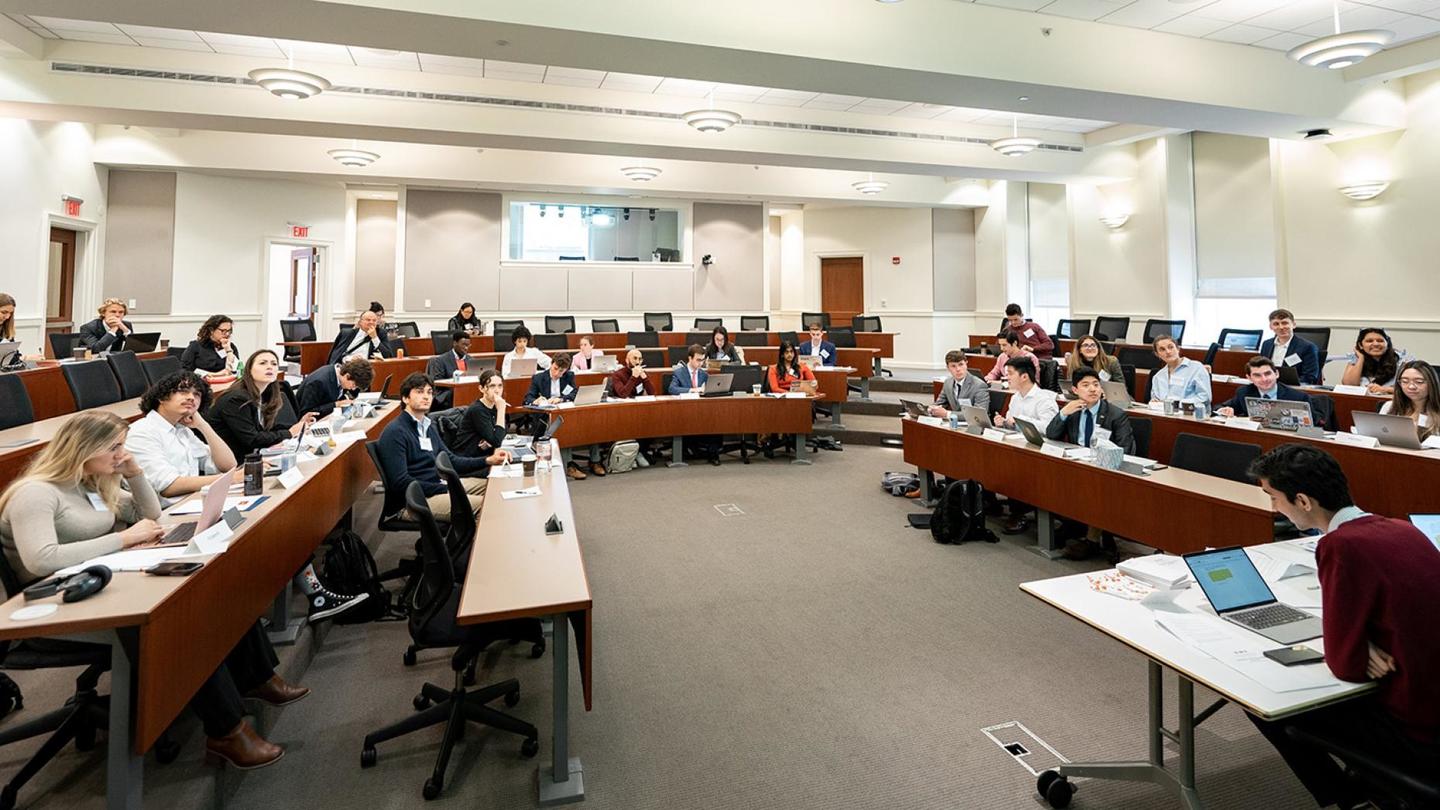Liechtenstein Institute’s Student-Led Simulation Holds Promise for U.N. Reform

At SPIA’s Liechtenstein Institute on Self-Determination (LISD), a student-led simulation is helping diplomats, students, and faculty members envision scenarios to foster a more accountable United Nations Security Council.
The U.N. aims to maintain international peace and security and achieve international cooperation on a range of important global issues, but it has long been accused of being insufficiently representative of the global community. When the U.N. was established, 750 million people in large parts of the world, including India, Indonesia, and most of the African continent, were under colonial rule. Today, the Security Council still grants a veto power to its five original Permanent Members – China, France, Russia, the United Kingdom, and the United States. In contrast, populous countries such as Nigeria or the Philippines have served as temporary, non-veto-holding members on the council only a handful of times, and each time, they had to compete to be elected to their seat.
Many proposals for U.N. reform have circulated over the years, but they never quite got off the ground. Recently, however, prospects for reform brightened considerably. The General Assembly approved a resolution last year that mandates the body meet any time one or more of the five Permanent Members cast a veto. The so-called Veto Initiative resolution also invites the Security Council to submit a special report on the use of the veto in question ahead of the General Assembly meeting. At this meeting, the UNGA debates the veto, and the member or members that cast it are invited to justify its use.
The outcome of the General Assembly meeting is open, and the UNGA could pass a resolution of its own on the issue. It hasn’t done so yet, but the Veto Initiative is only a year old. Over time, the interactions and outcomes at these UNGA meetings may change the relationship between the General Assembly and the Security Council, and lead to a more accountable UNSC and a more transparent and effective U.N.
The Liechtenstein Institute recently convened a student-led simulation in order to consider pathways for reform through the Veto Initiative. The Permanent Mission of Liechtenstein to the U.N., which proposed the Veto Initiative, attended the simulation, and the Princeton International Relations Council co-sponsored. The students of the Organizing Committee – MPA students Charles Fraser and Elmir Mukhtarov and prospective SPIA majors TJ Eyerman and Aly Rashid – planned the simulation according to Model U.N. rules of procedure and wrote simulated resolutions and reports.
The simulation took place in late April, almost a year to the day of the adoption of the Veto Initiative resolution. It simulated a vetoed Security Council resolution on the situation in Myanmar and explored both the General Assembly’s capacity to respond to the veto through a resolution and the key areas of tension and alignment among Member States on questions relating to the interaction between the UNSC and the UNGA.
Twenty-five undergraduate and graduate students participated, representing all Permanent Members of the Security Council and a range of other countries, from Bangladesh to Vietnam.
“The Organizing Committee and the students who participated did a phenomenal job,” said Barbara Buckinx, a LISD associate research scholar and the faculty organizer of the event. “One of the diplomats in attendance reflected on how accurately their colleagues at the U.N. were being represented.”
Three General Assembly resolutions were proposed and two passed, both of which noted, with regret, the casting of the veto. In addition, one resolution emphasized the importance of the UNGA as the world’s representative body and recommended a reinforced Veto Initiative that would provide for a General Assembly vote any time a Security Council veto is cast.
“The simulation presented a unique confluence of Model U.N. style of debate and inspiration from actual U.N. proceedings,” said Rashid, who chaired the debate. “For someone who has done Model U.N. for a long time, the reflections of U.N. diplomats on Model U.N. proceedings were invaluable. In addition, it was inspiring to see how the Veto Initiative gave a voice to blocs not prominently present in the UNSC, such as a coalition of Muslim countries which were able to add a mention of the Rohingya refugees.”
The diplomats and policy experts who attended were impressed as well.
“It was a great honor and pleasure to attend the first ever student-led simulation of a Veto Initiative convening,” said Myriam Oehri, Deputy Permanent Representative of Liechtenstein to the U.N. “We at the U.N. are still in an early phase of implementing the Veto Initiative resolution, and nothing could be more helpful in exploring the possibilities it holds than through valuable simulations such as these.”
The Liechtenstein Institute plans to turn the U.N. Veto Initiative Simulation into an annual event in order to regularly reflect on the impact of the Veto Initiative and the ever-changing international relations landscape.
